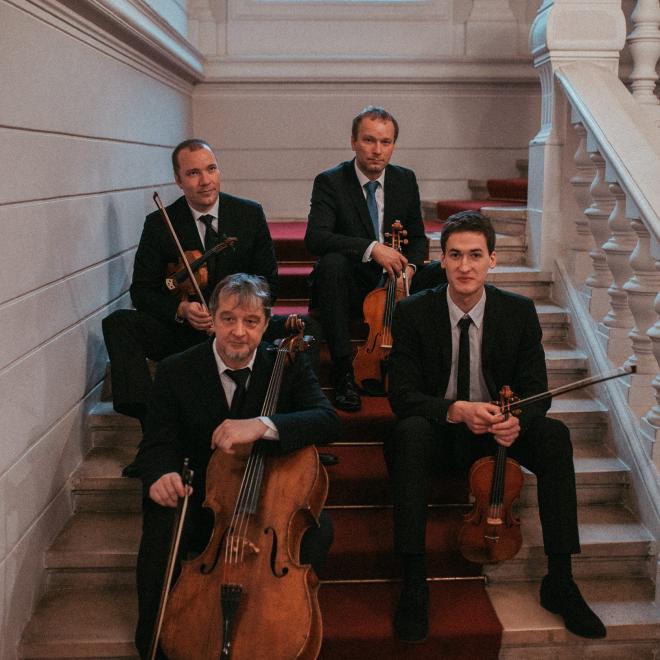
- More
- Performance
Founded as the first permanent, professional ensemble of its kind on the Croatian music scene, the Zagreb Quartet gave their first concert on 25 April 1919. The members at the time were Václav Huml, first violin, Milan Graf, second violin, Ladislav Škatula (later Miranov), viola, and Umberto Fabbri, cello – all of them professors at the Zagreb Conservatory. Over the first decades of its existence, numerous musicians passed through the Quartet (Jan Prybyl, Jan Holub, Francis E. Arány, Dragutin Aranyi, Zlatko Topolski, Stjepan Šulek, Aleksandar Szegedi, Ljudevit Dobronji...); in this early period, the Zagreb Quartet set high standards of performance and has been one of the staples of quartet music in Zagreb and Croatia ever since.
The ensemble defined its programme concept early on, with its wide repertoire ranging from classical composers, such as Haydn, Mozart, Beethoven, Brahms and the so-called ‘iron’ quartet repertoire, to contemporary music with particular emphasis on Croatian composers. Their performances have regularly included the works of Božidar Širola, Josip Štolcer Slavenski, Fran Lhotka, Antun Dobronić, Boris Papandopulo, Milo Cipra, Milko Kelemen, Marko Ruždjak, Frano Parać, Dubravko Detoni and many others.
In the season of 1930/31, they had their first international tour across what is today the Czech Republic and Germany, where they were highly praised and often referred to as ‘the famous’. They have regularly performed in Croatia and abroad ever since. In addition to their European performances, they have had a number of extensive tours across the USA, the former Soviet Union, Russia, Canada, Australia, New Zealand etc. The practice of collaboration with other renowned soloists also started in their early phase.
The first period of the Zagreb Quartet ended with the onset of World War II, whereas the new chapter began in 1954 at the initiative of the members of the Academic String Quartet – Josip Klima, Tomislav Šestak, Dušan Stranić and Zvonimir Pomykal. Violinist Josip Klima led the Quartet the following two decades, with short interruptions, and was succeeded, until 1987, by Zlatko Balija, Edo Pečarić and Đorđe Trkulja. Other members were violinists Zlatko Balija, Edo Pečarić, Nikola Jambrošić, Ivan Kuzmić and Marija Cobenzl, violists Dušan Stranić and Daniel Thune, and cellists Fred Kiefer and Josip Stojanović. The longest-lasting member of the ensemble, of 37 years, was violist Ante Živković. (Musicologist Hana Breko singled out two main line-ups during the second phase: the first included Josip Klima, Zlatko Balija, Dušan Stranić and Fred Kiefer, the second Josip Klima, Ivan Kuzmić, Ante Živković and Josip Stojanović.) It should be noted that in this period, novelties and contemporary ideas introduced by Music Biennale Zagreb since 1961 influenced the ensemble’s repertoire and they regularly performed and premiered the latest domestic and international quartet pieces.
Marking the beginning of a new period, Goran Končar assumed the position of the first violin in 1987 and held it until 2012. Other members were Goran Bakrač and later Davor Philips (since 2001) as the second violin, violists Ante Živković and, since 2005, Hrvoje Philips, and Martin Jordan on cello (since 1991). The period is marked by concert series at the Mimara Museum and the Revival Stateroom of the National Hall in Zagreb, and since 2008 at the Croatian Music Institute, where the Quartet has remained until this day. In the 1990s the ensemble’s reputation was confirmed by international tours and performances, which helped draw attention of the international public to the war in Croatia. The ensemble performed at the Concertgebouw in Amsterdam, Rudolfinum in Prague, St. John's Smith Square in London, the UN building in New York, Guangyuan Concert Hall and other venues, and their performances included major works such as Bach’s The Art of Fugue and Beethoven’s Late String Quartets, as well as the unique performance of Haydn’s Seven Last Words of Christ in the crypt of the Church of St Anne in Jerusalem. Since 2012 Sergei Evseev and Marin Maras briefly held the position of the first violin, and since the season of 2017/18 Martin Krpan has been the first violin of the ensemble, composed of Davor Philips, Hrvoje Philips and Martin Jordan.
The Quartet’s extensive discography, built over an entire century, includes editions released by Jugoton, PGP RTB, Melodicom, Sastruphon, Nuova Era Records, ZYX Classic, RCA, Da Camera Magna, Croatia Records, ZG Zoe, Cantus/HDS and other labels. Their latest albums – Leoš Janáček and Antonín Dvořák’s quartets as well as the monumental four-CD set recorded on the occasion of their hundredth anniversary – were released by Spona Classics.
Their numerous awards and accolades include major national awards: the City of Zagreb Award (1957 and 2001), the Milka Trnina Award, Vjesnik’s Josip Štolcer Slavenski Award, the Vladimir Nazor Award, the Vatroslav Lisinski Award, Charter of the Republic of Croatia for Special Merits in Culture (1999), numerous Porin Awards and the Vladimir Nazor Award for Lifetime Achievement (2009).
Zagreb Quartet | Ivan Krpan, piano
- 04. August 2024./ Sunday / 21:30 Rector's Palace Atrium +Tickets
Zagreb Quartet | Žarko Perišić, bassoon | Milan Milošević, clarinet
- 25. July 2022./ Monday / 21:30 Rector's Palace Atrium +Tickets
Zagreb Quartet | Ana Vidović, guitar
- 02. August 2019./ Friday / 21:30 Rector's Palace Atrium +Tickets
